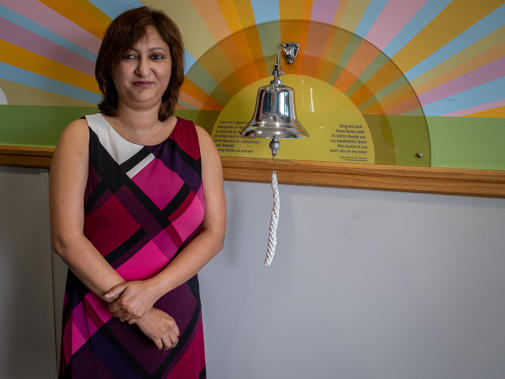Growing up in a liberal, educated, middle-class Asian family, me and my two sisters were taught at an early age to ‘remember, you are as good as any boy'.
Fast forward to young adulthood, I recall my feminist friends and colleagues commenting on how the female gender is far superior; in terms of multitasking, perseverance, high EQ, and brains to go with it.
Natural selection has made women strong, to bear the pains of pregnancy, childbirth, and cyclical hormonal phenomenon. In fact, medical science has devoted an entire specialty to the female reproductive system and pathology associated with it, and even gave it a posh name: gynaecology.
In the word ‘woman’ itself, two additional letters act as prefix to the other gender, lending it extra weight. Does that not prove the point? Somehow, I felt a bit uneasy with such strong arguments.
Unknown to myself at that time, I was evolving into a woman who defines herself and doesn’t feel apologetic about it. I was doing a clinical (CRUK PhD) fellowship at Queen’s University, and my parallel clinical commitment was with Belfast City Hospital. I had given up my cushy life with my doctor husband (previously my batch mate) at our beachfront penthouse apartment in Porthcawl to go to Northern Ireland, chasing my dream of PhD.
I had never imagined going to Northern Ireland, even for a holiday (for those who have not visited this beautiful country, well-endowed with natural wonders, you’re missing something!), yet there I was, in a completely alien environment, thrown into the deep end. Amongst my predominantly male academic peers, I had all the typical characteristics marked for failure: I was a hard-core physician, a female, a foreigner, and a ‘fossil’ student.
In my first year, a well-known European female lecturer visited to talk about women empowerment. She asked us what it meant for us and I remember my prompt answer, much to my own surprise.
I said: 'We will achieve women empowerment the day when women won’t have to wear power suits in high achieving interviews to convince the panel that they are capable.'
Not more capable, because it’s not a competition between genders. Not equally capable, because male counterparts are not our benchmark. But simply capable, period. There was a stunned silence in the audience for a few seconds, following this heartfelt remark.
In my second year of fellowship, I fell pregnant. My husband was still in Wales, and he applied for inter-deanery transfer to support me. Our application was turned down twice on the basis that I had chosen to undertake the PhD as out-of-program (OOP) training out of my own volition.
It wasn’t mandatory. Memories of those days will forever be etched in my mind, reminding me how strong a woman can be if she chooses to break that conventional glass ceiling. I was on my own with no social support, heavily pregnant, lugging grocery bags - one on each of my ten fingers - to reach my fourth-floor apartment.
I frequently had to go back to the lab after-hours and on weekends to ensure my experiments were running smoothly. Added to this, I had clinical commitments and a share of SpR on-calls. While I tried to juggle several balls at the same time, my mum reminded me during her routine phone calls that I need to look after myself and eat well, for the baby to thrive.
Some days were harder than others. I sometimes thought ‘this is it; I can’t take anymore’. And then immediately I would think, ‘well, perhaps, just one more push, just one more day’. Unknowingly, my resilience grew. The world at large was Goliath, I was David (well, the female version!) and I was just not ready to give up.
I managed to find some very supportive Irish colleagues who later transitioned into close friends, my mentors rooted for me, and finally the Deanery gave us the approval for the inter-deanery transfer. We were reunited as a family after our beautiful daughter was born.
In a delirious moment, I thought ‘Hallelujah; my fighting days are over’! But little did I know, my journey had just begun. My husband left shortly after to do a prestigious fellowship at Edinburgh University, and he had my full support. But I was left with a two-year-old baby, back in a full-time clinical job and finishing up my PhD dissertation, all at once. And I thought incredulously ‘here we go again!’
I was awarded my PhD in 2015; the same year I was also awarded a post graduate diploma (with distinction) as a remote learner from Newcastle University. I had started this course prior to my PhD and had decided (quite bullishly) to see this through to completion as best as I could.
Subsequently in the role of a consultant oncologist, despite several challenges, I led on a new oncology service in a newly established Cancer Centre in Northern Ireland. The service received regional acclaim and was appreciated by the visionary and wise clinical director.
After my family relocated back to Wales, I have carried on building on my previous experience, and adding on further layers from each challenge that I now perceive as an opportunity: An opportunity to be a better patient-centred clinician, a more supportive partner, a morally responsible parent, a caring daughter for my elderly mum, and a citizen with strong ethical core values.
Balancing multiple roles, sometimes I pause and say to myself, ‘it’s okay if you don’t win every fight. You only lose, if you lose to yourself.’ Being female, being feminine, is conventionally perceived as an Achilles’ heel. For me, my core strength lies in identifying myself as a ‘woman’; everything else follows thereafter.
Sonali Dasgupta is a consultant medical oncologist in Velindre University NHS Trust

